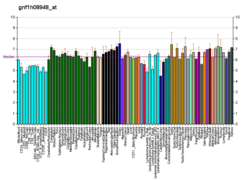| ABRA | |||||||||||||||||||||||||||||||||||||||||||||||||||
|---|---|---|---|---|---|---|---|---|---|---|---|---|---|---|---|---|---|---|---|---|---|---|---|---|---|---|---|---|---|---|---|---|---|---|---|---|---|---|---|---|---|---|---|---|---|---|---|---|---|---|---|
| Identifiers | |||||||||||||||||||||||||||||||||||||||||||||||||||
| Aliases | ABRA, STARS, actin binding Rho activating protein | ||||||||||||||||||||||||||||||||||||||||||||||||||
| External IDs | OMIM: 609747; MGI: 2444891; HomoloGene: 34713; GeneCards: ABRA; OMA:ABRA - orthologs | ||||||||||||||||||||||||||||||||||||||||||||||||||
| |||||||||||||||||||||||||||||||||||||||||||||||||||
| |||||||||||||||||||||||||||||||||||||||||||||||||||
| |||||||||||||||||||||||||||||||||||||||||||||||||||
| |||||||||||||||||||||||||||||||||||||||||||||||||||
| Wikidata | |||||||||||||||||||||||||||||||||||||||||||||||||||
| |||||||||||||||||||||||||||||||||||||||||||||||||||
Actin-binding Rho-activating protein is a protein that in humans is encoded by the ABRA gene. The mouse and rat homologues are known as STARS (striated muscle activator of Rho signalling) and MS1 (myocyte stress 1) respectively.
MS1/STARS is regulated by MyoD during myogenic differentiation of the C2C12 cell line.
References
- ^ GRCh38: Ensembl release 89: ENSG00000174429 – Ensembl, May 2017
- ^ GRCm38: Ensembl release 89: ENSMUSG00000042895 – Ensembl, May 2017
- "Human PubMed Reference:". National Center for Biotechnology Information, U.S. National Library of Medicine.
- "Mouse PubMed Reference:". National Center for Biotechnology Information, U.S. National Library of Medicine.
- Arai A, Spencer JA, Olson EN (Jul 2002). "STARS, a striated muscle activator of Rho signaling and serum response factor-dependent transcription". J Biol Chem. 277 (27): 24453–9. doi:10.1074/jbc.M202216200. PMID 11983702.
- "Entrez Gene: ABRA actin-binding Rho activating protein".
External links
- Human ABRA genome location and ABRA gene details page in the UCSC Genome Browser.
Further reading
- Hartley JL, Temple GF, Brasch MA (2001). "DNA cloning using in vitro site-specific recombination". Genome Res. 10 (11): 1788–95. doi:10.1101/gr.143000. PMC 310948. PMID 11076863.
- Wiemann S, Weil B, Wellenreuther R, et al. (2001). "Toward a catalog of human genes and proteins: sequencing and analysis of 500 novel complete protein coding human cDNAs". Genome Res. 11 (3): 422–35. doi:10.1101/gr.GR1547R. PMC 311072. PMID 11230166.
- Simpson JC, Wellenreuther R, Poustka A, et al. (2001). "Systematic subcellular localization of novel proteins identified by large-scale cDNA sequencing". EMBO Rep. 1 (3): 287–92. doi:10.1093/embo-reports/kvd058. PMC 1083732. PMID 11256614.
- Strausberg RL, Feingold EA, Grouse LH, et al. (2003). "Generation and initial analysis of more than 15,000 full-length human and mouse cDNA sequences". Proc. Natl. Acad. Sci. U.S.A. 99 (26): 16899–903. Bibcode:2002PNAS...9916899M. doi:10.1073/pnas.242603899. PMC 139241. PMID 12477932.
- Ota T, Suzuki Y, Nishikawa T, et al. (2004). "Complete sequencing and characterization of 21,243 full-length human cDNAs". Nat. Genet. 36 (1): 40–5. doi:10.1038/ng1285. PMID 14702039.
- Gerhard DS, Wagner L, Feingold EA, et al. (2004). "The status, quality, and expansion of the NIH full-length cDNA project: the Mammalian Gene Collection (MGC)". Genome Res. 14 (10B): 2121–7. doi:10.1101/gr.2596504. PMC 528928. PMID 15489334.
- Wiemann S, Arlt D, Huber W, et al. (2004). "From ORFeome to biology: a functional genomics pipeline". Genome Res. 14 (10B): 2136–44. doi:10.1101/gr.2576704. PMC 528930. PMID 15489336.
- Kuwahara K, Barrientos T, Pipes GC, et al. (2005). "Muscle-specific signaling mechanism that links actin dynamics to serum response factor". Mol. Cell. Biol. 25 (8): 3173–81. doi:10.1128/MCB.25.8.3173-3181.2005. PMC 1069631. PMID 15798203.
- Mehrle A, Rosenfelder H, Schupp I, et al. (2006). "The LIFEdb database in 2006". Nucleic Acids Res. 34 (Database issue): D415–8. doi:10.1093/nar/gkj139. PMC 1347501. PMID 16381901.
- Kuwahara K, Teg Pipes GC, McAnally J, et al. (2007). "Modulation of adverse cardiac remodeling by STARS, a mediator of MEF2 signaling and SRF activity". J. Clin. Invest. 117 (5): 1324–34. doi:10.1172/JCI31240. PMC 1838928. PMID 17415416.
This article on a gene on human chromosome 8 is a stub. You can help Misplaced Pages by expanding it. |




